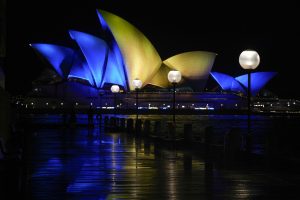Russia’s invasion of Ukraine is creating the largest displacement of people in Europe since World War II. So far, 3 million people have fled the country. According to UNICEF, since the start of the invasion one child has become a refugee almost every second. The bulk of these refugees are currently in Poland, yet it will soon become necessary for a more coordinated and shared response from Western countries to the crisis. The stress placed on Poland in particular is something Australia has a responsibility to help alleviate.
So far the Australian federal government has granted around 4,000 temporary visas to Ukrainians since the invasion began. These visas have mostly been issued to people who have family in Australia. Yet it is not just Australia’s 40,000-strong Ukrainian community who are keen to help. This war has created a strong spirit of compassion and a desire to be of assistance. The public will expect the Australian government to do more, with community groups very willing to assist.
There is a notable shift in public sentiment in Australia in response to the crisis. Over the past two decades Australia’s response to refugees has been fraught. While maintaining a refugee resettlement program of around 13,000 people annually, the country has been incredibly harsh toward anyone seeking to arrive in Australia through irregular channels. The projection of “Fortress Australia” – compounded with its strict pandemic measures – has done much to undermine the kind of country Australia claims to be.
While there is some merit to the government’s assertion that it seeks to discourage dangerous sea crossings from Indonesia, political parties have often played on the public’s fears by demonizing refugees for political gain. The treatment of detained refugees – particularly in Australia’s offshore detention facilities – has also been needlessly cruel.
The displacement of people due to conflict is obviously an emotive issue. Much of the suspicion toward refugees in Australia has emerged because people identify refugees with instability, and instinctively feel that they may be transporting instability with them. In a country like Australia that not only highly values its stability, but sees its geographic isolation as a great advantage to shield itself from the problems of the world, these feelings can often be pronounced.
Yet these feelings are also based on a lack of understanding of the conflicts or regions of the world that refugees are fleeing from. Most of the world’s conflicts are not leading news bulletins, making the front page of newspapers, or dominating social media. There’s not a strong public body of knowledge that can help generate empathy, and people fear what they do not know.
However, Ukrainians refugees transcend these instinctive responses because the general public is currently very aware of what is happening in Ukraine. Information on the Russian invasion is ubiquitous, and there is an obvious and known aggressor, with obvious victims. Russia’s Vladimir Putin, especially, is a known-entity in Australia, and someone who has been viewed negatively in the country for many years.
This has created a strong public sense that Australia should be doing more to help people fleeing Ukraine. The federal government would have strong support were it to increase the number of Ukrainians that it is providing protection visas for. Both the Victorian and Queensland premiers have indicated they are ready for their states to help.
While it might be easy to be cynical about the different responses to European refugees compared to refugees from other regions of the world, the goal instead should be to use this moment to reframe public perceptions toward refugees more broadly, and allow greater empathy to develop for those fleeing other conflict zones too. The public sympathy for Ukrainian refugees also presents a unique opportunity for the Australian government to extricate itself from the harsh and expensive detention policies that have blighted the country for the past two decades.
While Russia’s attack on Ukraine is a brutal and devastating physical attack on the Ukrainian people, it is also an attack on ideas. It’s an attack of the kind of society Australia is, and the kind of society Ukraine has been striving to become. This means that one of the important ways Australia can contribute is through a demonstration of its values, by engaging in serious self-analysis, understanding where Australia is failing to live up to its own ideas, and seeking remedies.
No liberal democracy will ever be able to meet the perfect standard of the humane values they claim to embody. Yet if there is a time for countries like Australia to make a concerted effort to reach more purposefully toward these ideals then it is now, when these values are under brutal assault. The West may be hoping to keep itself out of a hard power war with Russia, yet there is a serious soft power war that it is already fully immersed in. How it now responds to Ukrainian refugees — and refugees in general — is a major test.

































